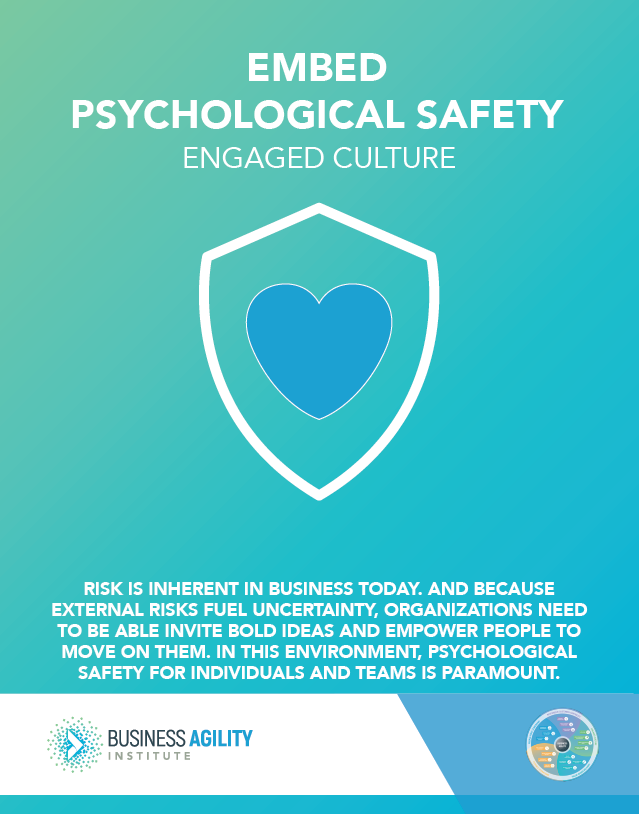Domains of Business Agility
- Responsive Customer-Centricity
- / Fiercely Champion The Customer
- / Sense & Respond Proactively
- / Integrate Diverse Ideas
- Engaged Culture
- / Cultivate A “Learning Organization”
- / Engage Transparently & Courageously
- / Embed Psychological Safety
- / Act As One
- Value-Based Delivery
- / Unleash Workflow Creatively
- / Prioritize. Prioritize. Prioritize.
- / Deliver Value Sooner
- / Seize Emergent Opportunities
- Flexible Operations
- / Adapt Strategies Seamlessly
- / Fund Work Dynamically
- / (Re)Organize Structures Fluidly
- / Balance Governance And Risk
- People-First Leadership
- / Foster Authentic Relationships
- / Empower With Accountability
- / Realize People’s Potential
Risk is inherent in business today. And because external risks fuel uncertainty, organizations need to be able to take swift, calculated action. They need to be able to invite bold ideas and empower people to move on them. In this environment, psychological safety for individuals and teams is paramount. It needs to be woven into the DNA of an organization and modeled by its leaders.
First defined by Amy Edmondson of Harvard, “psychological safety” is “a shared belief held by team members that the team is safe for interpersonal risk-taking.” In other words, it is safe to speak up, challenge ideas, ask questions, disagree, and make mistakes without fear of repercussions. In an environment where such actions are not only acceptable but expected, creativity and innovation thrive. Notably, it’s not effective if there’s just a façade of psychological safety. Actions need to match words — to ensure psychological safety, everyone needs to work consistently to nurture it, quickly identify when it breaks down, and take immediate, transparent action to repair it.
Primary Behaviors
The following 3 behaviors strongly contribute to the ability to embed psychological safety.
B27: Everyone nurtures an open and welcoming environment allowing others to authentically speak their mind: Creating a culture of psychological safety and a safe working environment is everyone’s responsibility. Everyone needs to be “in the moment” and aware of their impact on others. Leaders especially need to be vulnerable, open, and transparent.
B28: Everyone actively cultivates a growth mindset: People with a growth mindset believe that everyone can develop new skills and capabilities, that failure is an opportunity to learn, and that learning and improving is more important than being right. In contrast, people with a fixed mindset tend to believe that people have a predetermined potential, that failure should be avoided, and that being right is most important. From a practical perspective, people have a mixture of growth and fixed mindsets, and they continually work to develop and sustain more growth-oriented mindsets more often.
B29: Leaders create a sense of belonging through inclusive experiences: When designing and facilitating interactions between the company and an individual, leaders at all levels of the organization consider how to ensure that all participants feel that they belong, are included and have a voice that is heard.


